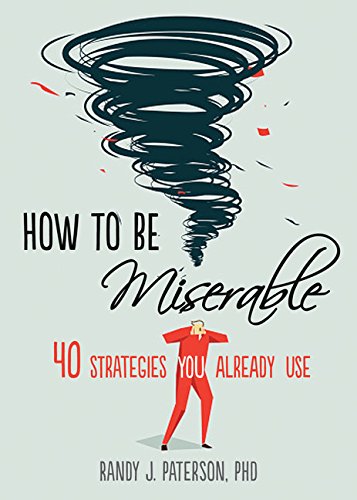In a previous post I shared my insights and thoughts about the first 10 strategies in the book, How to Be Miserable.
I wanted to continue to share my thoughts from the book as this book has really pushed my thinking and forcing me to self reflect on my decisions and actions.. In part two of this book the author discusses How to Think Like an Unhappy Person.
If you have not already listened to the podcast in which I had a chance to interview the author, then I highly suggest giving that a listen as it is loaded with so many amazing insights: 048: Living On The Edge of Chaos – How To Be Miserable with Randy Paterson
Probably one of my favorite concepts in this whole book is when he discusses that we spend our entire life viewing an inner cinema. We have three screens to choose from.
- Historical dramas of the past
- Fiction about our imaginary future
- Documentary of the present moment
- A screen that sensationalized and fictionalizes all the feeds
What I love best about this concept is the only screen that is non-fiction is the present one. This really stood out to me and I have read this passage time and time again as I try to remind myself not to dabble too much in the past or stress too much about the future.
Strategy 11: Rehearse the Regrettable Past
This is one we probably all struggle with from time to time. The issue where we focus on the negative opast despite the fact we can’t do anything about them. What we end up doing is focusing on all the things we are not good at or times we made mistakes instead of focusing on the positive and what we are actually capable of doing. I instantly thought of my own children and students in the classroom. How do we help them with this struggle? I don’t believe anyone doubts that this is an issue, but how do we encourage and promote a growth mindset in students and kids?
Strategy 12: Blame Inward, Give Credit Outward
Pretty straightforward. We don’t give ourselves enough credit when it is due while blaming ourselves for all the bad. Stop doing that!
Strategy 13: Practice the “Three Bad Things” Exercise
As ridiculous as this sounds, I bet that everyone reading has used this strategy. Lay in bed before sleeping and think of all the bad things that have happened. Beat yourself up. And then find yourself stressing, not being able to sleep and then stressing that you are not stressing. Even better is when you wake up mad that you did not sleep good.
Or you can do the opposite and simply change your attitude and focus on the good. Try that instead!
Strategy 14: Construct Future Hells
When we have something happening in the future don’t spend all your time focusing on everything that can go wrong. We all do it. We have a big speech and we stress over all that go wrong. Why do we spend all this time focusing on future hells and zero effort about things turning out fine? Once again, stop doing this!
Strategy 15: Value Hope Over Action
“…hope and fear come from a focus on the imaginary future rather than the singular moment of present reality.” Stop using hope as a substitute for action and go make things happen. Trust me you will get more done and won’t be wasting all your mental energy.
Strategy 16: Become a Toxic Optimist
This one I struggled with a bit. We must be positive, but not to the point we don’t actually listen to the haters. This strategy suggests this very thing and reminds me of the book Hug Your Haters. The part I question is where he suggests that we should focus all our attention on the course we desire. I think there are times when we must do this to avoid being busily bored and distracted by excuses of moving into action.
Strategy 17: Filter for the Negative
I just love this sentence, “Your emotions are governed not by the circumstances of your life, but by the circumstances to which you pay attention.”
Strategy 18: Cultivate Your Presence – Elsewhere
Just kept on reading on this one
Strategy 19: Insist on Perfection
“Much of our misery results from the way we view ourselves – particularly in the way we compare our performance against attainable standards.”
We cannot be perfect and must let go of the notion that others expect us to be perfect. Be you. Be awesome.
“Remember that your emotions are based on your beliefs about reality, not reality itself.”
Strategy 20: Work Endlessly on Your Self-Esteem
Listen to the podcast on this one. It was discussed at length. Do you think self esteem exists? Interesting element to really think about. This is by far the most talked about strategy of them all and I have found myself traveling the rabbit holes of research to learn more.
I wanted to continue to share my thoughts from the book as this book has really pushed my thinking and forcing me to self reflect on my decisions and actions.

Leave a Reply